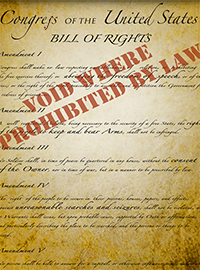
|
The proper word for this is censorship. The proper word for campaign finance reformers, therefore, would be censors.
|
|
| (First in an occasional series)
Campaign finance reform is the cause du jour for certain federal bureaucrats, activists, law professors and aspiring presidential candidates. It is now an article of faith for would-be reformers that money corruption is pervasive in our elections, and that the only way to combat corruption and its appearance is to impose more government control — and thus more coercion.
It’s also an article of faith that the Supreme Court’s campaign finance decisions over the past five years — notably Citizens United v. FEC and McCutcheon v. FEC — have done irreparable harm to democracy. The only way to save democracy from the corrupting influence of money is to jettison one of democracy’s cornerstones: unfettered freedom of political speech.
The proper word for this is censorship. The proper word for campaign finance reformers, therefore, would be censors. Who are they?
Meet Tom Udall. Every year since 2011, the Democratic senior U.S. Senator from New Mexico has introduced a constitutional amendment that would empower Congress and the states to “regulate the raising and spending of money and in-kind equivalents” in elections.
Udall’s inaptly titled “Democracy for All” amendment begins with a rationale: “To advance the fundamental principle of political equality for all . . .” In order to achieve that elusive goal, the amendment explicitly allows lawmakers to limit the “amount of contributions to candidates for nomination for election to, or for election to,” state and federal office, as well as the “amount of funds that may be spent by, in support of, or in opposition to” candidates.
Mindful that his proposed amendment would draw criticism from civil libertarians right and left (the ACLU opposes it), Udall inserted some palliative language: “Nothing in this article shall be construed to grant Congress the power to abridge the freedom of the press.” But that’s not much of a guarantee at all, because it leaves open the possibility — indeed, the high likelihood — of federal regulators deciding who or what counts as “the press.”
Don’t forget what was at issue in the Citizens United case: a political film critical of Hillary Clinton. Because Citizens United is a nonprofit 501(c)4 group that engages in political activity, the Bipartisan Campaign Reform Act of 2002 barred it from buying time on cable television to show the film within 60 days of the 2008 primary election. The Supreme Court ruled that provision of the law, better known as McCain-Feingold, was an arbitrary and unconstitutional violation of Citizens United’s free speech rights.
If the government could prevent a film from being shown in the name of combating political corruption, it could surely prevent a book or a pamphlet from being published on similar grounds. That strikes at the very heart of the First Amendment. That’s why the only way around the Court’s decision is another constitutional amendment.
Udall’s amendment has 40 cosponsors, all Democrats or nominal independents. No Republican has signed on, although that doesn’t mean Republicans necessarily rule out new regulations or amending the Constitution for that matter.
Meet Lindsey Graham. The senior U.S. Senator from South Carolina and Republican presidential aspirant remains a fervent supporter of the McCain-Feingold law and voted in favor of cloture last year on Udall’s amendment, before voting against the amendment itself a few days later.
Graham nevertheless favors a constitutional amendment of some kind. “You’re gonna need a constitutional amendment to fix this problem,” he told a New Hampshire audience in April. “I was for McCain-Feingold, the Supreme Court ruled 5-4 that provisions in McCain-Feingold basically no longer apply.”
Graham continued: “The next President of the United States needs to get a commission of really smart people and find a way to create a constitutional amendment to limit the role of super PACs because there’s gonna be like $100 million spent on races in New Hampshire . . . ripping everybody apart.”
Who might some of those “really smart people” be? Meet Ann Ravel. The Democratic vice chairman of the Federal Elections Commission last October began the process of undoing a 2006 rule that exempted free Internet videos and issue advocacy websites from federal campaign oversight. “A reexamination of the commission’s approach to the internet and other emerging technologies is long over due,” she said.
The commission’s three Republicans, including Chairman Lee Goodman, objected. In a joint statement following the October meeting, they argued that the 2006 policy is working just fine. “This freedom has gained wide acceptance, as evidenced by the hundreds of thousands of political videos, websites, blogs and other social media posted on the Internet without so much as an inquiry by the Commission,” they wrote.
At a follow-up meeting in February, Democratic commissioner Ellen Weintraub noted that the FEC had received more than 32,000 public comments on possible regulations, and noted how “75 percent thought we need to do more about money in politics, particularly in the area of disclosure. And I think that's something that we can’t ignore.”
Weintraub is right. The obscure regulatory workings of a powerful federal commission, no less than the public pronouncements of presidential candidates, cannot be safely ignored — not when censorship is disguised as the public interest. |

